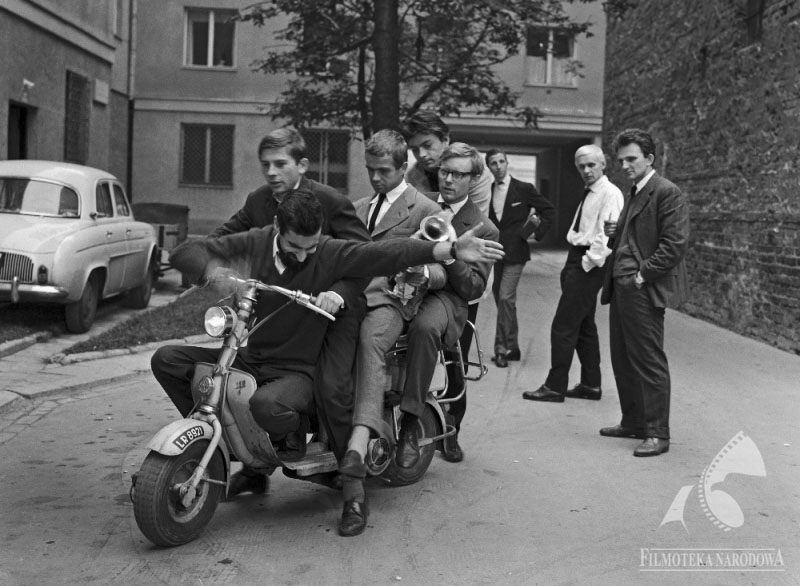In Andrzej Wajda’s copious output one might find a few surprising films that at first seem only slightly Wajdean as they don’t address historical issues and are limited to a minimalistic description of interpersonal relationships. Innocent Sorcerers from 1960 may be considered such an unusual film. This is the first fully contemporary work by the director, which doesn’t look back at the wartime past. This portrait of thirty-year-olds wouldn’t be so interesting if not for the input of Wajda’s young collaborators, such as Jerzy Skolimowski or Krzysztof Komeda, who strongly marked their presence in the film.
The eponymous innocent sorcerers (this expression was taken from the first part of Mickiewicz’s Dziady) are people of various professions, who share a common lifestyle: evenings at trendy Warsaw bars, a love for jazz, and an aversion for any commitments. Bazyli (Tadeusz Łomnicki) works as a sports doctor and plays the drums in a band and dates women in his spare time. Everything suggests that his next catch will be Pelagia (Krystyna Stypułkowska) – a girl from out of town whom he meets at a bar. Pelagia enters the social-erotic game and agrees to go to Bazyli’s apartment for the night.
Innocent Sorcerers are aesthetically much different than Wajda's earlier works: the bulk of the film is made up of the private meeting of the two heroes, which abounds with great, humorous dialogues, but the film also includes scenes that are more loosely linked to the plot and follow a convention that is similar to cinéma vérité. One could search for inspiration taken from the French New Wave if it was not for the fact that Wajda’s picture was being created at the same time as the first masterpieces of Godard and Truffaut – a direct influence is therefore out of the question. Thanks to the rather easy narration and quasi-documentary interludes Innocent Sorcerers was greatly innovative in this its day and remains a very charming film that has a unique, one-of-a-kind atmosphere. In order to bring to mind the film’s distinctive character one might remind of such fragments as the morning tomfoolery of Bazyli’s hung-over friends (Roman Polański and Krzysztof Komeda are among them), or the journey through Warsaw on a scooter.
 Frame from the film "Innocent Sorcerers”; in the photo: Roman Polański, Jan Zylber, Andrzej Trzaskowski, Krzysztof Komeda, Andrzej Nowakowski, Henryk Kurek, Tadeusz Łomnicki, Andrzej Wojciechowski; photo: Film Studio “Kadr” / National Film Archive / www.fototeka.fn.org.pl
Frame from the film "Innocent Sorcerers”; in the photo: Roman Polański, Jan Zylber, Andrzej Trzaskowski, Krzysztof Komeda, Andrzej Nowakowski, Henryk Kurek, Tadeusz Łomnicki, Andrzej Wojciechowski; photo: Film Studio “Kadr” / National Film Archive / www.fototeka.fn.org.pl Wajda’s work is occasionally self-referential, which is interesting: in the very beginning we see Vasovians walking in front of a poster for… Innocent Sorcerers, in another moment a hero speaks directly to the camera, etc. It seems that these modernist devices are not only supposed to problematize the issue of the film medium, but that they are also supposed to point towards the fictitiousness and artificiality of “modern” life, which itself has begun to imitate a spectacle.
The first scene is already characteristic of this. In it, Bazyli doesn’t let a girl into his home, because he wants to listen in solitude to a tape recording of her voice which was made earlier: the tape player gives total control over reality, it can be turned on and off at any moment. The characters in Innocent Sorcerers are ashamed of their feelings and they do anything not to reveal too much. Even their names – Bazyli and Pelagia – are merely pseudonyms invented for the purpose of a social game. However, putting on masks and poses leads to boredom and emptiness, to an undefined sense of absence.
Wajda treats the carefree, post-war generation with reserve - he is distrustful toward the modern lifestyle, but he doesn’t fall into shallow moralizing. All in all, the lost characters from Innocent Sorcerers (also the supporting ones, including the great Zbigniew Cybulski) are quite likeable and their ironic strategy of survival is nothing more than an answer to changing social conditions. The film tells the story of the changes in civilization that are brought by modernity, but the local context is also important here: the feeling of hopelessness and the urge to escape from reality are caused by the “little stabilization” policy, which was introduced by the communist leader Gomułka.
 Frame from the film "Innocent Sorcerers”; in the photo: Zbigniew Cybulski, photo: Film Studio "Kadr” / National Film Archive / www.fototeka.fn.org.pl
Frame from the film "Innocent Sorcerers”; in the photo: Zbigniew Cybulski, photo: Film Studio "Kadr” / National Film Archive / www.fototeka.fn.org.pl The lack of clear condemnation of the 'cynical' and antisocial behaviour caused Innocent Sorcerers to be very strongly criticized by the communist authorities. The director had to change the ending so that it would be more 'elevating'. The film retained its lightness and charm despite the intervention of the censors. Many years after the its premiere, Wajda’s picture is a mine of knowledge about the Polish morals and culture of the turn of the 50s and 60s.
Author: Robert Birkholc, April 2014
Translated by: Marek Kępa
Innocent Sorcerers (Niewinni czarodzieje), Poland 1960. Directed by Andrzej Wajda. Screenplay: Jerzy Andrzejewski, Jerzy Skolimowski. Cinematography: Krzysztof Winiewicz. Music: Krzysztof Komeda. Scenery: Leszek Wajda. Cast: Tadeusz Łomnicki (Bazyli), Krystyna Stypułkowska (Pelagia), Wanda Koczeska (Mirka), Kalina Jędrusik (journalist), Zbigniew Cybulski (Edmund), Roman Polański (double bass player), Jerzy Skolimowski (boxer) and others.
A Film Group “Kadr” Production. Black and white, 83 minutes.